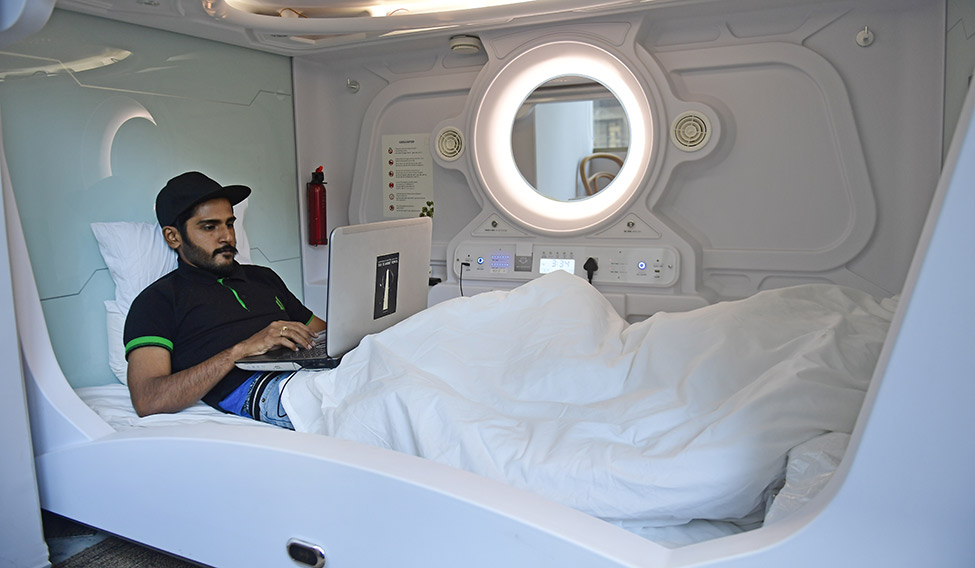On a Friday evening, after an overnight trip on a sleeper bus, we land up at Urbanpod—the first capsule hotel of the country. The ‘next-generation smart hotel’ has been set up on the first floor of a swanky building in Andheri East, Mumbai. A pristine reception area adjoins a ritzy cafeteria, followed by 140 pods.
Divided into segments, the first one has 18 classic pods—adjoined by three toilet-bathrooms—reserved for women, followed by a similar setup of 106 more pods, open to both men and women. It also has six private pods for people who want complete privacy and ten suite pods for pairs.
At first glance, the two-level modular plastic capsules, stacked next to each other, appear like bunker beds. But after swiping the keycard to the capsule, it feels like a swankier version of the sleeper bus we got off a couple of hours ago.
Popularly, the format of a capsule hotel that originated in Japan in the late 1970s has often been compared to a mortuary—a poor comparison considering its ostentatious look and feel. The pod has a comfy bed, a personal locker, TV with headphones, personal reading light, power socket, hangers, a dresser, besides the free Wi-Fi and adjustable air-conditioning. If you slide the door and lock yourself inside the pod, you may have all the privacy you need—for a deep sleep or a reading in solitude. But there is liveliness otherwise. You often bump into other guests in the restroom area, the ratio of which is 1:8.
Operational since early March, the outlet, spread across 10,000sqft, has had more than 100 customers. “A lot of inquiries are being made and many corporate visits are happening, too,” says Hiren Gandhi, Urbanpod’s director and cofounder. It was his friend Shalabh Mittal, also the CEO of Mercator Limited, who thought of exploring the idea in India after a stay at a capsule hotel in Singapore almost two years ago. “He was very pushy about it,” says Gandhi, who runs three four-star hotels in Gujarat.
Research was first conducted in Singapore, China and Japan, where the concept is hugely popular. During recession in late 2000, it is said that the underemployed or the unemployed people in Japan rented pod hotels by the month. Gandhi and Mittal are not looking for a similar customer base, but are aiming at young travellers and traders who are looking for spaces to crash while in transit, and are aiming at the burgeoning corporate sector that travels frequently and doesn’t necessarily need the amenities provided in a regular four-star hotel.
Gandhi wanted a first-mover advantage and thus opted for discreet research in India. “Two to three things that came out clearly was that people were not happy paying an x-price for a certain kind of hotel. If they are paying a certain amount, say Rs 4,000, they didn’t really want what they were actually getting during their stay. They would be okay not getting certain amenities they don’t use and paying a less price,” he says. But going to a lower price bracket means you are compromising on the hygiene and the basic upkeep of the place. “We have balanced out the value proposition with this concept,” he claims.
The average price of a classic pod [7.1ft long, 4.3ft wide and 3.10ft high] is Rs 2,000 per night. For a budget traveller, even this may seem a little expensive, but Gandhi is hopeful that the concept will click. “Until we don’t do it, we would never know. The Indian traveller is evolving. We have a lot of young people travelling now than earlier. And they want to try out new experiences,” says Gandhi. “We are open for more such properties in other metro cities because that is where a concept like this may work best.”







